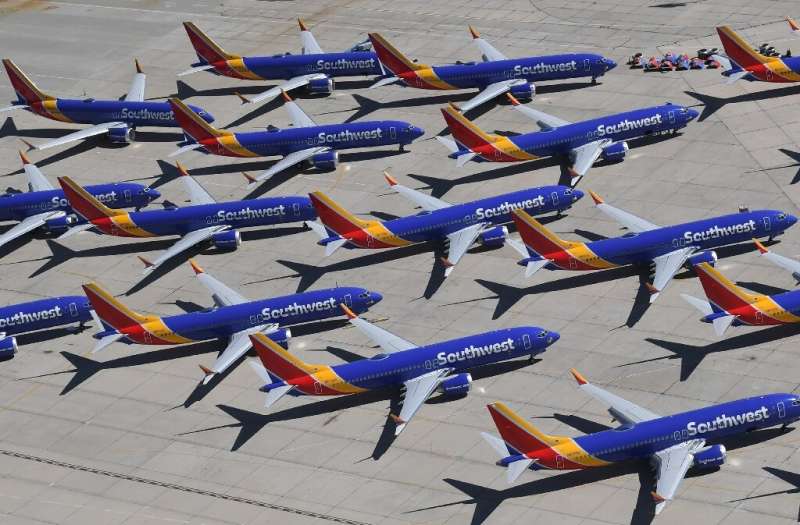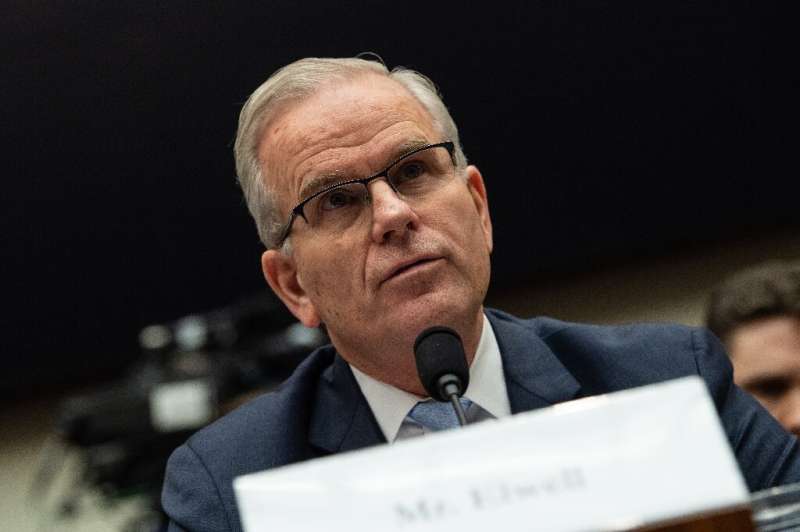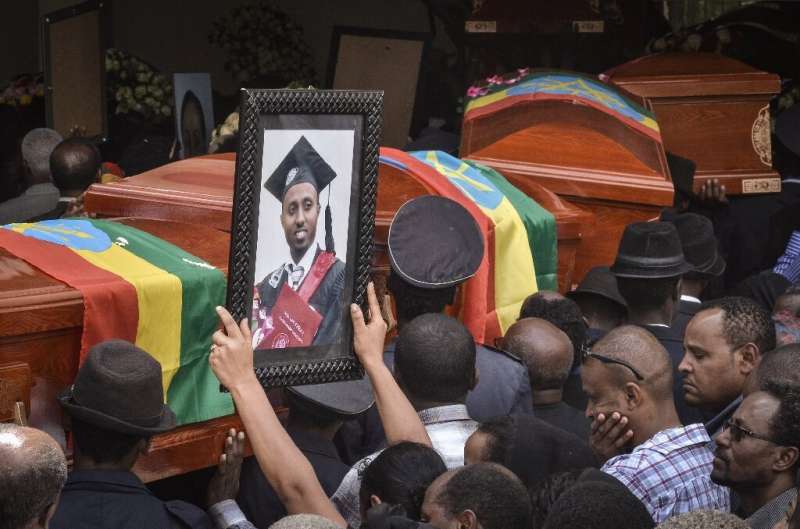The global fleet of Boeing 737 MAX planes has been grounded after two deadly crashes, including this group of Southwest Airlines planes photographed in California in March
Getting Boeing's top-selling 737 MAX back in the skies faces a critical test this week as the company and US regulators each seek to restore their reputations after two deadly crashes.
The US Federal Aviation Administration will convene a summit of global aviation regulators on Thursday to walk through the steps taken to address concerns with the MAX following criticism the agency dragged its feet on the decision to ground the jets.
Most agencies around the world have said little since the 737 MAX was grounded following the March 10 Ethiopian Airlines crash, which together with a Lion Air crash in October, claimed 346 lives.
So the gathering in Fort Worth, Texas is expected to provide clues as to whether the aviation safety authorities will be willing to set aside any skepticism about the FAA, which has not yet given the green light for the 737 MAX to fly again.
Regulators "are going to want a lot of explanation," said Richard Aboulafia of the Teal Group. "We're going to learn a lot."
The FAA would prefer to have other agencies quickly follow its lead—which previously would have been likely—but several aviation experts think that is improbable.
Officials from the European Union and Canada said Wednesday they will not clear the 737 MAX for takeoff until their questions are answered.
"There are conditions for us to have (the 737 MAX) return to fly and that is we do our independent review," said Jagello Fayl, communications chief for the European Union Aviation Safety Agency.
"We will assure that adequate training is agreed upon and put in place, that any changes by Boeing to the design is validated by us."
Daniel Elwell, acting administrator of the Federal Aviation Administration, hopes to coordinate global regulators on the resumption of flights of the Boeing 737 MAX
Transport Canada "has provided US Federal Aviation Administration and Boeing a list of questions and action items to address as part of the validation process and evaluation," Transport Canada spokeswoman Frederica Dupuis said in an email.
"Our expectation is that all data required to address these inquiries will be provided."
Dupuis said she "cannot speculate on the timelines" for approval of the 737 MAX by the FAA or Canadian officials.
"The Government of Canada will not lift the current flight restriction of the Boeing 737-8 MAX until it is fully satisfied that all concerns have been addressed by the manufacturer and the US Federal Aviation Administration, and adequate flight crew procedures and training are in place."
Still the 'gold standard'?
The FAA said 57 agencies from 33 countries will attend the summit, including China, France, Germany, Britain, India, Indonesia and Ethiopia, as well as the European Union Aviation Safety Agency (EASA) and the UN International Civil Aviation Organization.
The meeting comes after Boeing announced on May 16 that it had completed a software update to address a problem with the flight handling program known as the Maneuvering Characteristics Augmentation System.
In both of the MAX crashes, the MCAS pointed the plane sharply downward based on a faulty sensor reading, hindering the pilots' effort to control the aircraft after takeoff, according to preliminary crash investigations.
China's three largest airlines have sought compensation from Boeing over the grounding and delayed delivery of the jets, state media reported Wednesday.
Mourners carry portraits of victims of the crashed accident of Ethiopian Airlines during a mass funeral at Holy Trinity Cathedral in Addis Ababa, Ethiopia in March
A Boeing spokesman said the company does not comment on conversations with customers.
Lag after US?
Boeing said it is providing additional information to the FAA in anticipation of a certification test flight, a key step in winning regulatory approval.
Long considered a "gold standard" internationally, the FAA's reputation has suffered, amid scrutiny of the oversight process and reports it allowed Boeing to effectively self-certify some features of the MAX.
US lawmakers last week once again castigated acting FAA Administrator Daniel Elwell for lagging behind virtually all other regulators in grounding the planes, acting only after seeing data linking the two crashes.
Elwell told the panel the agency would permit the 737 MAX to resume flights "only when the FAA's analysis of the facts and technical data indicate that it is safe to do so."
Aviation experts expect the US agency to clear the way for the 737 MAX in time for major American airlines to resume flights in mid-to-late summer, as they have publicly announced.
But Ajay Singh, chairman and managing director of the budget Indian carrier SpiceJet, which reportedly operates 13 MAX jets and has nearly 200 more on order, told The Financial Times he expected the aircraft to be back in the air by July.
"We are confident that it's a great plane. It's a completely safe aircraft," he said in an interview published Wednesday. "So we are waiting for the regulators to take that view."
Elwell said he hoped other regulators "make their un-grounding as close to ours as possible."
© 2019 AFP


























